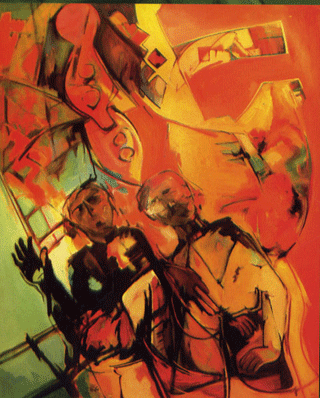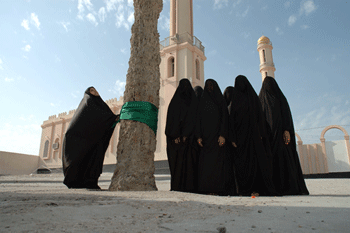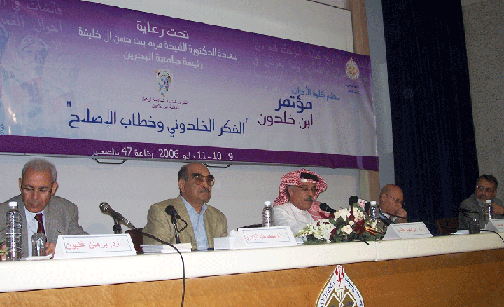
Painting by the Bahraini artist, ‘Abbas al-Mahroos (1943-2006)
Category Archives: Bahrain
A Dialogue With Allah

Figure 1: Mosque, women and palm tree.
By el-Sayed el-Aswad
Folk culture provides members of the society with living models in the form of iconic images, key symbols, and root metaphors that enable them to express themselves, and the other as well. Sanctity or religious meaning is bestowed on an object or place for the reason that a religiously significant event (a miracle, wonder or blessing) is associated with it.
At an art exhibition at the College of Art, Bahrain University last year, 2006, I was surprised to see very beautiful and stunning pictures in which a group of women were climbing palm trees (figure 2-5). Recognizing the cultural significance of the palm tree in Arab societies, I decided to interview Waheeda Malullah (figure 6), the artist whose photos show that the climbing of palm trees is not just aimed at the collection of dates commonly consumed in the Arab Gulf countries, but rather at the engagement in spiritual communication with invisible spheres of the cosmos and the achievement of blessing or grace (baraka), among other objectives. Continue reading A Dialogue With Allah
Post-Asabiyya: Ibn Khaldun and the Discourse of Reform: Part One

[left to right, Burhan Ghalioun, Muhammad ‘Abid al-Jabri, Ibrahim Gholum, Fahmy Jad’an and Abu-Ya’rab al- Marzouqi at University of Bahrain Ibn Khaldun conference in May]
The theme of “reform†in its socio-economic, political, religious, and ethical dimensions has been, for the last five years, a topic of greatest contention and debate in the Arab World. This theme was recently extensively deliberated in a conference entitled “Khaldunian Thought and the Discourse of Reform†in celebration of the 600th anniversary of Ibn Khaldun, the erudite Arab thinker, scholar, politician, and historian of the 14th century. Sponsored by the College of Arts at the University of Bahrain, it hosted renowned contemporary scholars including Muhammad ‘Abid al-Jabri, Burhan Ghalioun, Fahmy Jad’an and Abu-Ya’rab al- Marzouqi, among others. Continue reading Post-Asabiyya: Ibn Khaldun and the Discourse of Reform: Part One